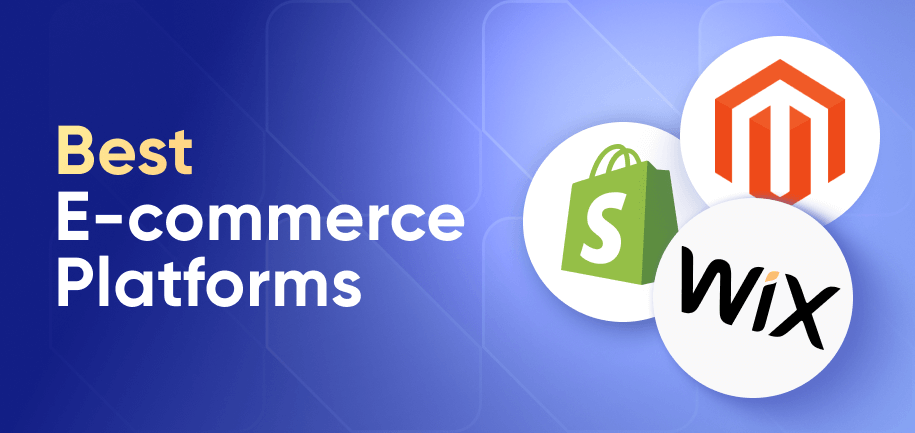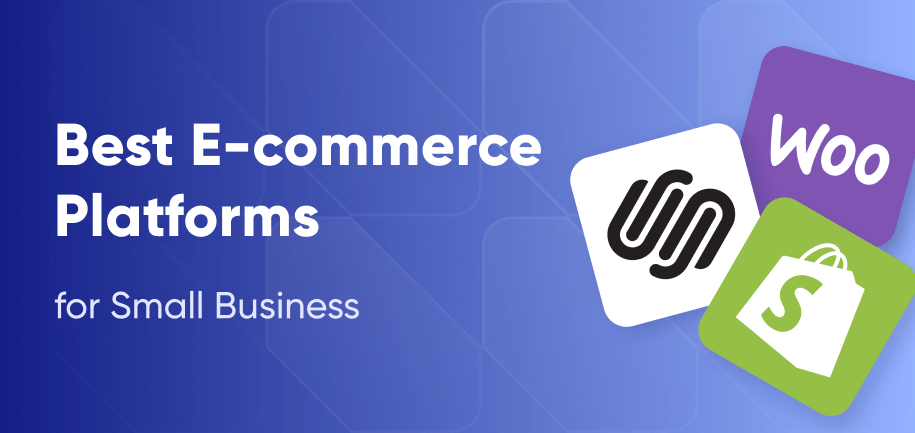The e-commerce industry continues to grow exponentially, making it necessary for businesses to choose the best e-commerce platform to build and manage their online stores. With countless e-commerce software solutions available, selecting the right one can be daunting.
To help you navigate through the options, we've compiled a list of the 6 best e-commerce platforms for 2025. This guide will help you find the best e-commerce website builder for your business.
What is the Best E-commerce Platform?
Before diving into the most popular e-commerce platforms, it's important to understand what makes a platform the "best."
The best e-commerce platform should be scalable, user-friendly, and equipped with robust features to meet your business needs. It also should provide powerful e-commerce software solutions to streamline your operations and enhance the customer experience.
Below, we’ve evaluated the leading e-commerce platforms based on features, ease of use, pricing, and overall value.
Platform | Best For | Key Features | Pros | Cons | Pricing |
|---|---|---|---|---|---|
| Shopify | Beginners, scalability | Drag-and-drop editor, app store, integrated payment options | Easy to use, scalable, 24/7 support | Higher costs for apps and scaling | Starts at $29/month |
| WooCommerce | Customization, WordPress users | Open-source plugin, SEO-friendly, extensive plugin library | Fully customizable, free core plugin | Requires technical expertise | Free (additional hosting & plugins cost) |
| BigCommerce | Growing businesses | Built-in SEO, multi-channel selling, no transaction fees | No hidden fees, strong scalability | Limited design customization | Starts at $29/month |
| Wix e-commerce | Small businesses, ease of use | Drag-and-drop builder, marketing tools, hundreds of templates | Affordable, beginner-friendly | Limited scalability | Starts at $17/month |
| Squarespace | Creative professionals | Stunning templates, built-in marketing tools, blogging capabilities | Beautiful designs, an all-in-one solution | Fewer integrations, not ideal for scaling | Starts at $23/month (Business Plan) |
| Magento (Adobe Commerce) | Enterprise businesses | Fully customizable, advanced analytics, multi-channel support | Highly scalable, enterprise-level features | Expensive, requires technical expertise | Custom pricing; Open-source version available |
Key Takeaways:
- Shopify is the best all-around option for businesses of any size, especially for scalability and ease of use.
- WooCommerce is ideal for WordPress users who need full customization and control.
- BigCommerce offers excellent built-in features for growing businesses with no hidden transaction fees.
- Wix e-commerce is perfect for small businesses or solo entrepreneurs just starting out.
- Squarespace excels in creating visually stunning online stores for creative industries.
- Magento is the top choice for enterprise-level businesses needing robust tools and scalability.
Let’s explore the top e-commerce platforms for your online store.
1. Shopify: The Best Website Builder for Online Stores
When it comes to popular e-commerce platforms, Shopify is a name that stands out. Known as one of the leading e-commerce platforms, Shopify powers over a million businesses worldwide. Its flexibility, extensive app ecosystem, and user-friendly interface make it one of the best e-commerce website builders available.
Key Features:
- Ease of Use: Shopify offers a simple drag-and-drop editor, making it one of the best e-commerce website builders for beginners.
- Customizability: Choose from hundreds of themes to design your store.
- Apps & Integrations: Access to an app store with thousands of tools for marketing, SEO, inventory management, and more.
- Payment Gateway: Integrated payment options with Shopify Payments, along with third-party gateway support.
Pros:
- Highly scalable for businesses of all sizes.
- Excellent customer support available 24/7.
- Reliable hosting with fast load times.
Cons:
- Monthly fees can add up as you scale.
- Limited control over technical backend for advanced users.
If you're seeking an all-in-one e-commerce software solution, Shopify is often regarded as the best website builder for online stores.
2. WooCommerce: The Customizable E-commerce Solution
WooCommerce is an open-source plugin for WordPress, making it an excellent option for businesses seeking highly customizable e-commerce solutions. As one of the top e-commerce platforms, WooCommerce allows you to turn your WordPress site into a powerful online store.
Key Features:
- Free to Use: The core plugin is free, though you may incur costs for hosting, themes, and extensions.
- Customizable: Extensive library of plugins and themes for added functionality.
- SEO-Friendly: Built on WordPress, WooCommerce benefits from powerful SEO tools.
Pros:
- Full control over your store's design and functionality.
- Ideal for businesses with specific technical needs.
- Active community support and documentation.
Cons:
- Requires some technical expertise for setup.
- Hosting and extensions can become expensive.
If you’re comfortable working with WordPress, WooCommerce is one of the best e-commerce software options for customization.
3. BigCommerce: A Powerful E-commerce Software Solution
BigCommerce is a feature-rich platform designed for growing businesses. Often listed among the most popular e-commerce platforms, BigCommerce is known for its robust functionality and scalability. It’s an excellent choice for businesses looking for comprehensive e-commerce solutions.
Key Features:
- Built-In Features: Advanced SEO tools, multi-channel selling, and payment processing come standard.
- Scalability: Ideal for small to enterprise-level businesses.
- No Transaction Fees: Unlike many other platforms, BigCommerce does not charge transaction fees.
Pros:
- Excellent built-in features reduce the need for additional apps.
- Easy integration with platforms like eBay, Amazon, and Facebook.
- Strong support for international selling.
Cons:
- Limited design customization compared to competitors.
- The pricing model may not be ideal for smaller businesses.
For growing businesses, BigCommerce is undoubtedly one of the best e-commerce platforms to consider.
4. Wix E-commerce: The User-Friendly Option
Wix is widely recognized as one of the best website builders for online stores, particularly for small businesses and entrepreneurs. Its intuitive drag-and-drop editor and affordable pricing make it a go-to choice for beginners looking for simple e-commerce solutions.
Key Features:
- Ease of Use: No coding knowledge is required to set up and customize your store.
- Templates: Hundreds of templates to create visually stunning online stores.
- Marketing Tools: Built-in tools for email marketing, SEO, and social media.
Pros:
- Affordable pricing plans for small businesses.
- Easy-to-use interface ideal for beginners.
- No additional costs for hosting.
Cons:
- Limited scalability for large businesses.
- Fewer advanced features compared to platforms like Shopify and BigCommerce.
For small businesses, Wix is one of the best e-commerce website builders to get started with.
5. Squarespace: Stunning Designs for Creative Businesses
Squarespace is a platform known for its design-centric approach. As one of the popular e-commerce platforms, Squarespace is perfect for businesses in creative industries like art, fashion, and photography, especially those offering unique items like custom glass canvas prints for wall art.
Key Features:
- Beautiful Templates: Award-winning designs optimized for mobile and desktop.
- Built-In Features: Blogging, marketing tools, and analytics come standard.
- SEO-Friendly: Tools to optimize your store for search engines.
Pros:
- Excellent design capabilities for visually appealing stores.
- Integrated marketing tools for promotions and campaigns.
- Simple pricing structure.
Cons:
- Limited integrations compared to other platforms.
- Not ideal for large-scale e-commerce businesses.
If aesthetics are a priority, Squarespace is one of the best e-commerce website builders to showcase your brand.
6. Magento (Adobe Commerce): The Enterprise-Level Powerhouse
Magento, now known as Adobe Commerce, is one of the top e-commerce platforms for large-scale businesses. Its advanced features and high level of customization make it a preferred choice among enterprises.
Key Features:
- Flexibility: Fully customizable for unique business needs.
- Advanced Features: AI-driven analytics, multi-channel selling, and customer segmentation.
- Scalability: Ideal for large businesses with high traffic volumes.
Pros:
- Powerful tools for large-scale operations.
- Excellent community and developer support.
- High level of customization for enterprise needs.
Cons:
- Requires technical expertise to manage.
- High costs for hosting and development.
For businesses ready to invest in a robust, scalable solution, Magento is one of the leading e-commerce platforms available today.
How to Choose the Best E-commerce Platform for Your Needs
When deciding on the best e-commerce platform for your business, consider the following factors:
- Budget. Determine your budget, including monthly fees, transaction fees, and additional costs for extensions or themes.
- Business Size. Choose a platform that aligns with the size and scale of your business.
- Ease of Use. If you're new to e-commerce, look for a platform with a user-friendly interface.
- Customization. Ensure the platform allows you to design and modify your store as needed.
- Features. Evaluate the built-in features and integrations offered by each platform.
- Scalability. Consider whether the platform can grow with your business.
Final Thoughts
The best e-commerce platform for your business depends on your specific needs and goals.
For beginners, Shopify and Wix are excellent choices due to their ease of use. For businesses that require customization, WooCommerce and Magento provide unmatched flexibility. BigCommerce offers robust features for growing businesses, while Squarespace is ideal for creative professionals seeking stunning designs.
By choosing the right platform, you can build a powerful online store, streamline your operations, and deliver a seamless shopping experience to your customers. Whether you’re looking for the best e-commerce website builder, the best website builder for online stores, or scalable e-commerce software solutions, there’s an option on this list for every business.

















